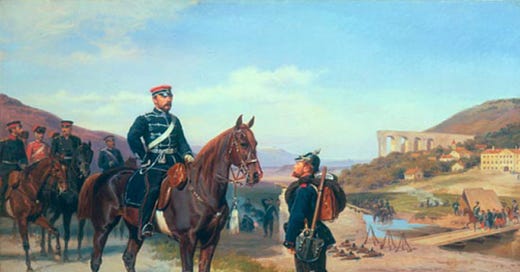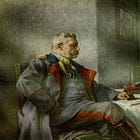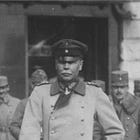This post is part of a long series. To read the parts that precede it, and those that follow, please follow the links on the following page.
Field Marshal Count Moltke, Count Schlieffen, and the World War
Georg Wetzell
(Continued)
The modern type of high command also reveals a tremendous discrepancy between the military commander at the desk and the true military commander; this will never change. To be sure, unlike Frederick the Great or even Napoleon, the 'modern military commander' cannot exert his influence personally and directly upon the troops; modern armies are too large for that. As Freytag-Loringhoven himself mentions, the activity of the modern military commander is shifted to the 'mental sphere'. Applied to modern conduct of war, this means that the modern military commander must rigidly impose his will, that is, his strategic and even tactical conceptions and ideas, upon his immediate responsible subordinates.
Modern military history, especially that of the World War, teaches us that the telegram or telephone message from some distant point in the rear does not suffice. Both can easily be misinterpreted. A personal clear discussion and oral explanation of the directives and orders has an entirely different effect. Therefore, we may say of Moltke that he fully adhered to the methods of Napoleon, though conducting his campaigns in a more modern fashion; and that Moltke, like Napoleon, was a great general precisely because he invariably took a hand at the right time in all great decisions for which he was responsible. In this respect, he further applied Napoleon’s procedure of transmitting instructions by liaison officers and adjutants to his more extended conditions (separately operating armies); he supplemented that procedure with officers of his general staff whom he had trained to follow his thoughts.
Moltke would send these officers to the various army headquarters with the mission of keeping the army commanders fully informed of his intentions both prior and during the battle. Thus Moltke sent Verdy [du Vernois] to the Crown Prince at the beginning of the War of 1870; later he dispatched Brandenstein, Bronsart von Schellendorff, and others during the operations around Metz and Sedan.
Hence Moltke is not only the man who studies the preceding operations (Schlachtendenker), but he is also and here is where his real greatness lies the director of the battle (Schlachtenlenker): Königgrätz, Metz, Sedan. Nevertheless he did not hesitate, on a certain occasion in 1871, categorically to wire Prince Frederick Carl, His Majesty’s most cautious army commander: 'His Majesty commands that the Second Army attack in the morning.'
Quoting Moltke, Foerster says that 'the progress made in the field armament, in short, the complete change of the conditions frequently seem to render it impossible to use the means which in former times served to gain victories and even seem to upset the rules laid down by the greatest military leaders'. The fundamental truth of this statement requires no emphasis. Yet all important writers of the pre-war period who have studied methods of high command, Goltz, Freytag-Loringhoven, Count Yorck [von Wartenberg] and others, admit that Moltke adhered to the principle of the rules of Napoleon.
That Moltke’s aforementioned expression may be applied also to his own ideas is shown by another remark of his, with regard to the use of the railroads for the concentration, to which Foerster likewise refers: 'Errors in the original concentration of the armies can hardly be corrected in the course of the campaign.' While these words may have applied through the seventies of the last century, they certainly did not hold true after those years, when the railroad system in Germany as that in France had grown more closely knitted and had expanded. That is shown most realistically by the great war games [Imperial maneuvers] of 1904 and 1905, which Count Schlieffen conducted.
As early as those years, this strategic genius moved entire armies by rail from the right flank of the German concentration, that is, from the region of Aachen, to Strasbourg and Metz, with the view of gaining a decision on that part of the front upon a change in the hostile disposition. Does not the World War teach us similar lessons, both on our side and on that of our opponents, including the Russians?
Even before the War, Freytag-Loringhoven in his book points out that this expression of Moltke has no meaning in modern times; and after the World War he writes of 'maneuvering by railroad'. General von Seeckt expresses himself in a similar vein.
Especially a modern military commander will do well, as Ludendorff suggests for the future concentration, to place troops in readiness at suitable railroad points far in the rear, for the purpose of rushing them to any part of the front where the situation may require their support (main effort) [Schwerpunkt]. The same applies to an even greater degree to the highly mobile motorized units of modern armies.
To be sure, the military commander must know beforehand that is, long before war is declared what the extent of his capacity is (instrument of warfare: Army, Navy, Air Force) and what his strategic objectives are. And yet I agree with Goltz that we should speak of a 'draft of operations' rather than of a 'plan of operations'. Napoleon claims that he at no time had an operations plan. Moltke makes a similar remark with reference to the War of 1870-1871. He always had an objective for his operations, the hostile capital: Vienna, Paris (this was the case also in most of Napoleon’s campaigns: Vienna, Berlin, Moscow). The enemy had no choice but to accept a battle along this route.
All major wars since the time of Napoleon, up to and including the World War, at the outset took a turn different from that which had been planned. The hostile situation, 'shrouded by the fog of uncertainty', in the majority of cases was other than the general had anticipated when preparing his plans in time of peace. Schlieffen appropriately says that 'the opponent usually does not assume the role which he has been expected to play.'
To be continued …








